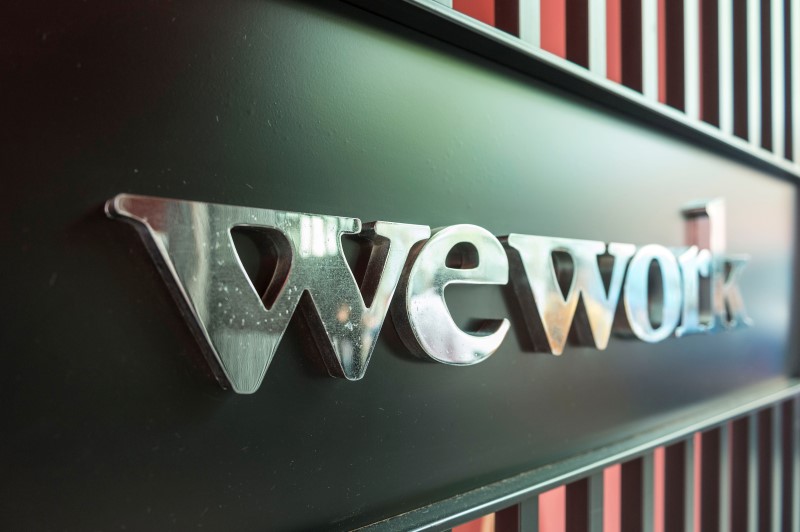By Kate Duguid
NEW YORK (Reuters) - WeWork Companies’ $702 million junk-bond debut last month included a feature investors in the space had seldom seen in recent years: a sweetened yield.
To persuade investors to buy the deal, the office-sharing firm ultimately jacked up the interest rate it would pay by about a full percentage point to 7.875 percent.
That deal and a handful of others in the $1.5 trillion high-yield market show that bond buyers are clawing back some of the leverage they ceded during nearly 10 years of indiscriminate buying in a sometimes-frantic hunt for yield.
In the past two months investors have pushed back on loose terms and low coupons on bonds rated BB or lower by Standard & Poor's or Ba and below by Moody's Investors Service, given safer alternatives are finally offering appreciable yields after years of rock-bottom interest rates.
Yields on 10-year Treasury notes (US10YT=RR) recently spiked above 3 percent for the first time in more than four years, fueled by higher U.S. debt supply and Federal Reserve rate hikes.
McDermott International (N:MDR) and American Greetings Corp have also had to sweeten offerings with juicier yields and stiffer covenants laying out the rules that issuers must follow.
"We absolutely, positively push back. We look at every set of covenants in every deal and negotiate really hard on all of them," said Krishna Memani, chief investment officer at OppenheimerFunds, which manages $243 billion in assets.
Bond managers worried about buying just anything this deep into a bull market and economic expansion are also getting choosier.
"There are some cracks in the primary market that have been signaling to investors that they shouldn't be buying everything," said Kathleen Gaffney, director of diversified fixed income at Eaton Vance, with $434 billion in assets under management.
The risk that assets will underperform in a downturn is one that "you’re just not paid for right now. I want bigger discounts and higher yields before I step in," she said.
COVENANTS IMPROVE, A BIT
Covenants cover everything from restrictions on payments like dividends to limits on how much debt a company can accumulate. When the market gets frothy, "high-yield-lite" deals spring up offering thin investor protections in the event of a downturn.To be sure, the quality of covenants remains low by historical standards, according to Evan Friedman, who produces Moody's Covenant Quality Index. And in general the premium investors are paid for holding junk debt is still near a post-recession low.
The spread of junk bond yields over Treasuries slid to 3.24 percentage points in April, just 0.01 percentage point above its narrowest since July 2007, according to the ICE Bank of America/Merrill Lynch high-yield bond index <.MERH0A0>.
That spread recently widened to 3.43 percentage points, however, and Moody’s covenant index showed investor protections improved in April for a fourth straight month after weakening for a year.
In an unprecedented move last year, two companies had been able to sell bonds skirting the requirement that issuers use proceeds from any asset sales to repay debt or invest in the business.
But this year, three others tried and failed to follow suit, said Ross Hallock, analyst at independent credit research firm Covenant Review. American Greetings, Pisces Midco and Titan Acquisition all were unable to find buyers until they dropped that effort.
Pisces sold $645 million of bonds to fund private equity firm Clayton, Dubilier & Rice's buyout of home remodeling products makers Ply Gem Industries and Atrium Windows & Doors, but initially alienated some long-time investors in both companies by offering a skimpy yield and weak covenants.
"We've been investors in both Atrium and Ply Gem for years," said one deal participant, who asked not to be named because he was not authorized to speak for the firm. But under the initial terms "it wasn't worth it."
After Pisces improved the coupon to 8 percent and relented on the soft covenants, the investor took "a small position, where we would have taken none if things hadn't tightened up."Greeting card maker American Greetings downsized its deal twice, finally pricing it at 87 cents on the dollar, and oil construction firm McDermott International was obliged to discount prices and add a new protection preventing the transfer of valuable intellectual property to unrestricted subsidiaries.
In the case of WeWork, the limited appetite for its bond was due in part to an unusual measure of profitability, which it called "community EBITDA." That metric excluded expenses related to interest, depreciation, amortization, marketing costs and more.
Negligible assets for investors to claim in the event of a default, because the company leases rather than owns the majority of its properties, also soured interest.
Although WeWork raised the deal size by $202 million to $702 million, it had to increase the coupon to sway investors.
Initially it was "high sixes, then it was low sevens, then price talk came out at 7.75 to eight," a source familiar with the deal said. It finally priced at 7.875 percent.
WeWork’s bonds have plunged since the sale, last trading at 94.125 cents to the dollar, and their yield has climbed to 9.029 percent.

(The story corrects paragraph 9 to say director instead of co-director)